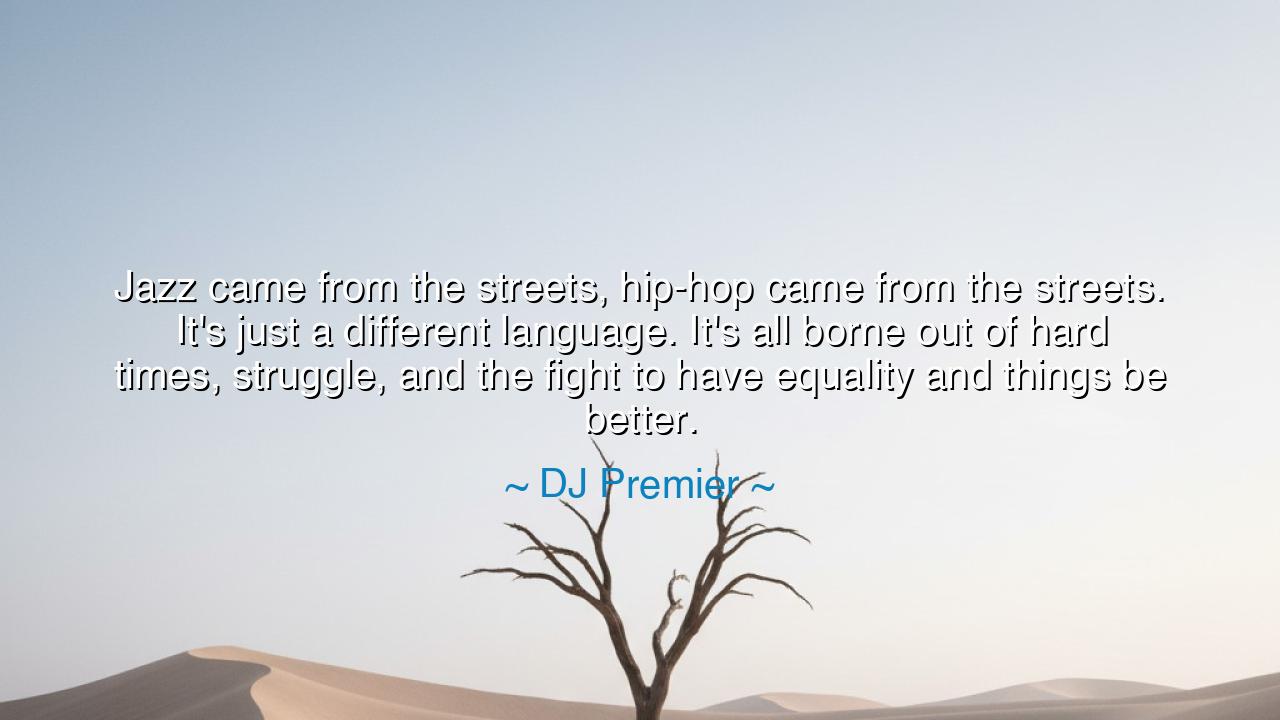
Jazz came from the streets, hip-hop came from the streets. It's
Jazz came from the streets, hip-hop came from the streets. It's just a different language. It's all borne out of hard times, struggle, and the fight to have equality and things be better.






The words of DJ Premier — “Jazz came from the streets, hip-hop came from the streets. It's just a different language. It's all borne out of hard times, struggle, and the fight to have equality and things be better.” — resound like a sacred rhythm, a drumbeat echoing through the corridors of time. They are the words of an artist who understands that music is not merely sound, but history given voice, emotion given movement, pain transfigured into beauty. In these words, he reminds us that both jazz and hip-hop — though born in different eras — share the same spirit, the same origin in struggle and the same yearning for freedom. They are not two separate tongues, but two dialects of the same eternal song — the cry of the oppressed transformed into the art of the free.
DJ Premier, one of the great architects of hip-hop, speaks from the lineage of the griots — the ancient storytellers who kept the memories of their people alive through rhythm and rhyme. He recognizes that music from the streets is not music of the lost, but of the found — the sound of souls who refuse to be silenced. Jazz, born from the blues of the Deep South and the blood of slavery’s legacy, rose as a voice of survival. It was the heartbeat of Black America in the early twentieth century, a testament that beauty could be carved even from sorrow. Decades later, hip-hop would rise from the same soil — from the streets of the Bronx, where young people turned despair into poetry, beats, and motion. Both art forms are children of hardship, yet each carries the brilliance of resilience, declaring, “We are still here.”
In the spirit of the ancients, one might say that both jazz and hip-hop are songs of the human condition. They are born of injustice, but they transcend it. Where the blues moaned of suffering, jazz answered with improvisation — a kind of freedom in sound, where every note defied predictability, every riff rewrote the rules. Centuries later, when new generations found themselves still shackled by inequality, hip-hop emerged as the next great improvisation — a new way to speak truth when no one would listen. Turntables replaced horns, and rhymes replaced lyrics, but the soul was the same. As Premier says, “It’s just a different language.” The message — the pursuit of equality, of dignity, of “things being better” — remained unbroken.
Consider the story of Louis Armstrong, one of the fathers of jazz. He was born into poverty in New Orleans, abandoned by his father, and sent to reform school at the age of eleven. Yet it was there, among the forgotten, that he first touched a cornet. From those streets, from that struggle, he would rise to become one of the greatest musicians the world has ever known. His trumpet sang not just melodies, but the history of a people who refused to die in silence. Decades later, in another generation, a young man named Tupac Shakur would pick up that same spirit — his words, not notes, painting the same truth in a new era: “I’m not saying I’m gonna change the world, but I guarantee that I will spark the brain that will.” And thus, as Premier reminds us, jazz and hip-hop are two breaths of the same spirit — one carried through brass and bass, the other through rhyme and rhythm.
DJ Premier’s insight is also a rebuke to those who would separate “high” art from “street” art. He teaches that greatness does not descend from ivory towers — it rises from the dust, the alleyways, the struggle. The streets are not symbols of poverty, but of creation. They are the crucibles where the human heart learns to fight, to feel, and to transform pain into sound. Every breakbeat, every horn blast, every word spat over a beat is a declaration that even in hardship, beauty will be born. The streets are not a place of shame — they are the birthplace of truth, the forge of culture, the wellspring of the world’s most enduring art.
And so, the lesson in Premier’s words is clear: from struggle comes strength, from oppression comes expression, and from silence comes song. Every generation must find its language — its rhythm, its sound, its way of speaking truth to power. The ancients had their epics; the enslaved had their spirituals; the dreamers had their jazz; the revolutionaries had their hip-hop. The form may change, but the spirit does not. It is the eternal rhythm of humanity — the fight for equality, the yearning for dignity, the insistence that life, however harsh, can still be transformed into art.
So remember this, children of tomorrow: do not turn away from struggle, for it is the soil where greatness grows. If your times are hard, make music of them; if your streets are broken, let them be your stage. Do not despise the noise of your own era, for within it lies the pulse of your people. As DJ Premier reminds us, jazz and hip-hop were born not from wealth, but from will — the will to rise, to create, to heal, and to hope. Let your art, whatever form it takes, speak the truth of your struggle — and in doing so, you will join the timeless symphony of those who turned hardship into harmony, and oppression into freedom’s song.






AAdministratorAdministrator
Welcome, honored guests. Please leave a comment, we will respond soon